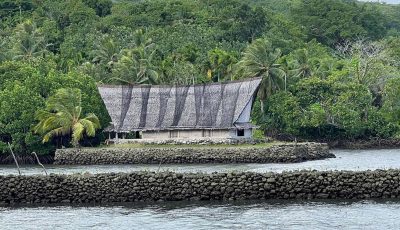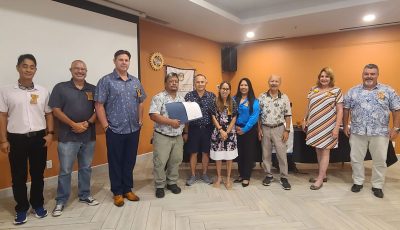Smoke testing of sewer system
The Commonwealth Utilities Corp. is informing its customers on Beach Road, Garapan between the I Love Saipan Building and Shenanigans Restaurant and Chalan Kanoa, Brigida Street behind LF Market to the M. Villagomez Building that there will be a smoke test of the sanitary sewer system within these areas to locate and identify location of all existing service connection connected to the section of the sewer main.
Smoke testing will commence tomorrow, Oct. 11, 2016, and is expected to run approximately two hours per area. For the area of Garapan, testing will be from 9am to 11am and for the Chalan Kanoa area from 1:30pm to 3:30pm.
For more information, contact the CUC Customer Call Center (664-4282) or monitor its Facebook page for the latest updates (https://www.facebook.com/CommonwealthUtilitiesCorporation/).
Smoke testing safety
During the testing, a special, non-toxic smoke is forced into the sewer lines in your neighborhood. This smoke leaves no residuals or stains and has no effect on plants or animals. Direct contact with the smoke may cause minor respiratory irritation in some people.
Testing notification
CUC’s wastewater collection systems staff will perform the smoke testing. The crew members will not request entry into your home, but will be available in the area to assist you if you have any questions about the process.
Smoke in your home or building
To keep smoke from unnecessarily entering your structure, run water into all of your drains for one minute, especially those drains your use infrequently. Smoke should not enter your structure unless:
Vents connected to your building’s sewer pipe are inadequate, defective or improperly installed;
Traps under sinks, tubs, basins, showers and other drains are dry, defective, improperly installed or missing; or
Pipe, connections and seals of the wastewater drain system in and under your building are damaged, defective, have clean out plugs missing or are improperly installed.
If you do see or smell smoke in your structure, immediately report it to the testing crew or contact the CUC Call Center at (670) 664-4282. This may mean that potentially harmful gases from the sewer could be entering your structure. Location, identification and correction of the smoke entering your home or business is strongly recommended. Do not be concerned if you see testing smoke coming from your rooftop sewer vents. This is normal.
Smoke testing FAQS:
Q: How does smoke testing work?
A: Smoke testing forces smoke-filled air through a sanitary sewer line. The smoke under pressure will fill the main line plus any connections and then follow the path of any leak to the ground surface, quickly revealing the source of the problem. Only enough force to overcome atmospheric pressure is required.
As long as openings exist for the smoke to follow, smoke tests are effective, regardless of surface type, soil type and depth of lines.
Q: Why does CUC smoke test?
A: Smoke testing is the most efficient and cost effective way to locate and identify locations where unauthorized water is entering the sewer system, or where unauthorized sewage is entering the storm drainage system.
Smoke testing is becoming a requirement nationwide for locating unauthorized water problems that are threatening the ability to properly treat wastewater and costing millions of dollars to wastewater treatment facilities.
Smoke testing will also help identify plumbing leaks in buildings. Sewer gases can cause health problems for building occupants.
Q: Will smoke testing of the sewers allow smoke to get into my home?
A: No, provided that your plumbing drain “traps” are not dry. Drains that are used once every several weeks should be okay. If you are not sure, simply run water down the drain for a minute to ensure that the trap is not dry. It is important to locate dry traps as they could allow sewer gas to enter the home.
Q: Is the smoke harmful?
A: No, this process is endorsed by the Environmental Protection Agency and has been safely used for more than 20 years. The “smoke” is not true smoke, but rather a mist containing a large percentage of atmospheric moisture that is highly visible at low concentrations. It will not harm your health or leave a stain and will disappear rapidly without leaving an odor. Material safety data sheets will be available upon request. Since any smoke can be an irritant, direct contact with the smoke may cause minor respiratory irritation in some people. Individuals with respiratory problems such as chronic asthma, emphysema or other respiratory conditions should avoid direct exposure to the smoke.
Q: What should I do if smoke gets into the house?
A: Contact a field crew member working in the area, or call the CUC Call Center at (670) 664-4282. Open windows for ventilation. The smoke will soon dissipate.
Q: If smoke gets into the house, how long does it take the smoke to dissipate?
A: The smoke will dissipate quickly with adequate ventilation.
Q: What is the purpose of smoke testing?
A: The main purpose of smoke testing is to locate areas where unauthorized water may be entering the sanitary system, or where sewage may be discharged to the storm drainage system.
Q: How will I know when the testing is scheduled to occur?
A: Signs will also be placed along the roadways during the testing.
Q: I will not be at home during smoke testing and have pets in the house. What should I do?
A: The smoke is not harmful to pets. It would be a good idea to leave several windows partially open for ventilation, in the unlikely event that smoke does enter the building.
Q: Can smoke plug the sewer?
A: There is no way smoke can plug the sewer. The smoke is made up of a vaporized substance.
Q: Where does the smoke appear?
A: Smoke may be seen coming from roof vents, building foundations, manhole covers or yard cleanouts. Smoke coming from roof vents on the roof of homes is a normal occurrence and indicates to the crews that smoke has filled all sewers.
Q: What happens if you find a bad sewer connector or leak?
A: This information will be documented for further investigation.
Q: Will rodents be smoked out?
A: No. However, the smoke may detect broken building sewers where there is a potential for rodent access. Owners will be notified to repair broken building sewers. (CUC)



























